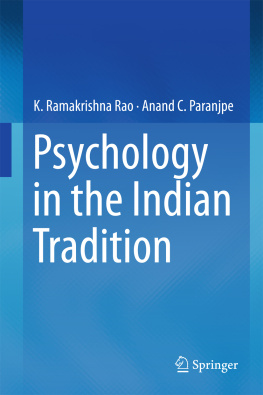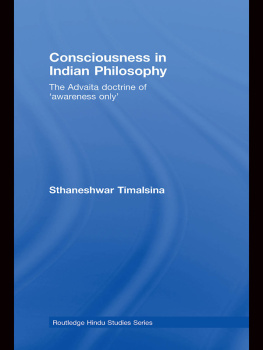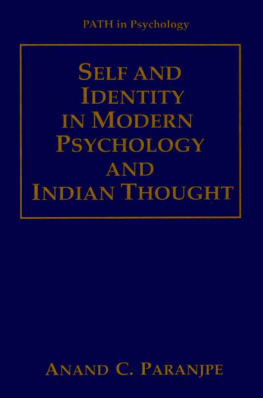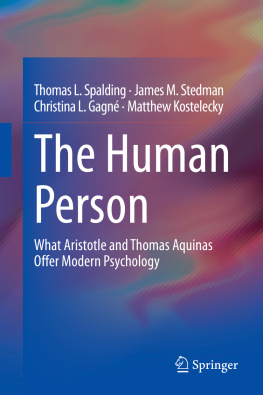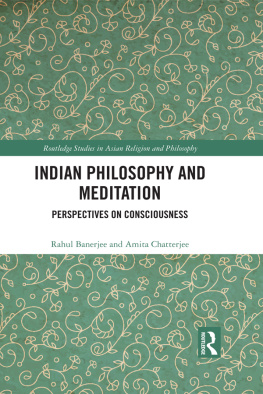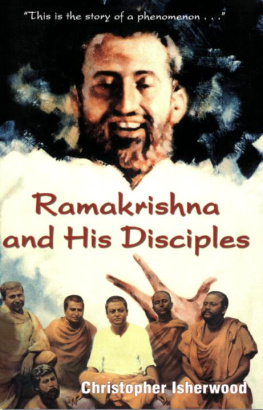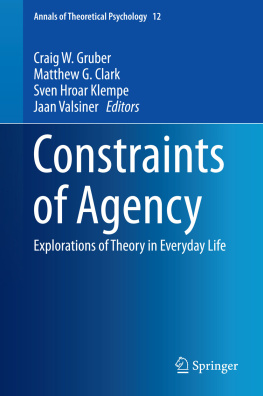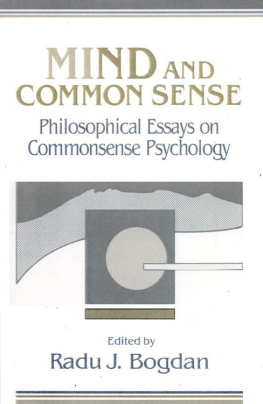1. Scope, Substance, and Methods of Study
tmnam viddhi , know thy self, is the central tenet of Indian thought. It is also the cornerstone of Indian psychology from the Vedic times to the present. By knowing yourself, it is believed, you know everything that needs to be known, because the truth is within you. You are the truth. That is you, tat-tvam-asi . If search for understanding the self is the base of philosophical pursuit, study of the ways of self-realization is the subject matter of psychology. This is the classical wisdom. Indian psychology attempts to study the person in order to understand human potentials and their realization in life. It aims at authentic living in pursuit of happiness that is lasting and not momentary. Realization involves more than cognitive knowing. It goes beyond knowing truth to incorporating that knowledge into ones being and conduct. Consequently, psychology is not mere theoretical knowledge, but it includes its application to life and living. Indian psychology, as we study it, involves a systematic reconstruction of classical Indian thought and native psychological practices. The resulting body of psychological knowledge enables us to understand human nature and to apply that knowledge to fully realize human potentials. Indian psychology utilizes and incorporates concepts, categories, and models derived from thought native to the Indian subcontinent and practices that have been developed and preserved for centuries.
Psychology as it has grown in the West is built on a set of assumptions governing the Western thought since the pre-Socratic times. As Peters (1962) the historian of psychology observes, psychology is a product of over twenty-three centuries of Western thought. What is known as psychology today, writes Peters, is just an amalgam of different questions about human beings which have grown out of a variety of traditions of inquiry (p. 27). Western psychology, as Bretts (1921) History of Psychology also shows, is built on the inheritance of a long line of religio-philosophical and medical writers.
In India also there is an equally long line of thinkers who have had profound insights into human nature. Unfortunately, psychology that is most commonly taught and practised today in India incorporates little of this. Indeed, Indian tradition has had very little impact on psychology as it had grown in the West and was adopted uncritically in India during the colonial period and continues to have its sway in the Indian academia. Standard psychology textbooks make no mention of Indian psychology. Books on history of psychology also make no reference to it. Perhaps the exception is Bretts three-volume History of Psychology . In Vol. I, Chap. 18, a section refers to Indian psychology under the heading Indian Writings. However, in the currently available abridged edition even this section is missing. Another exception is the revised edition of Theories of Personality by Hall and Lindzey (1978), which contains a section on Indian theories of personality. For all those who are familiar with the current state of affairs, it is clear that the rich psychological tradition prevalent in India for nearly 3000 years has had little influence on what is regarded as psychology now.
This scenario is especially disappointing to those of us in India with interest in psychology and some familiarity with Indian thought. This is so because psychology as taught and practised in Indian academia appears to lack appropriate relevance in the Indian context; and consequently it plays a minor role in national development. Imitating and merely replicating Western studies, psychologists in India have failed, with few exceptions, to creatively contribute to expansion of psychological knowledge. Finally, the fact that psychology in the Indian tradition is pregnant with alternate models that appear to satisfactorily address some of the challenges facing psychology today makes it equally frustrating to see that all that wisdom is lost to the inquiring minds. Those who have some exposure to native psychological wisdom cannot fail to note that indeed Indian psychology has the potential to bring about a paradigm shift in the way we look at human beings and how we may study them. We may find here the contours of a new and inclusive psychology that would help address issues that appear intractable from the current psychological paradigm.
1.1 What Is Psychology in the Indian Tradition?
In order to understand what Indian psychology is, it will be helpful to know first what it is not. Paradoxical as it may seem, Indian psychology is not what most psychologists in India teach or practice today. This is somewhat contrary to common sense perception that science is what scientists do. The two centuries of British rule not only had adverse effects on Indias politico-economic conditions, but it also disturbed the educational scenario in significant ways. Colleges and universities were established with the explicit goal of teaching Western science and culture and for training Indians to help the British to rule India. This has had a lasting impact on the Indian psyche, unlike anything in the past.
It was not unusual for India to attract people from other parts of the world for economic and other kinds of exploitation. This was going on for thousands of years. However, what is different in the modern colonization is that, in addition to economic exploitation and political dominance, it resulted in influencing and disturbing the indigenous culture and the Indian mindset in ways entirely different from the previous. On previous occasions, the incoming influence was eventually absorbed by the native culture and became its indistinguishable part. The attention given to education by the British rule and deliberately modeling it after their own to serve their interests, had a totally different result. Instead of a synthesis with the past, there was a cultural split and schism that has continued to characterize Indias intellectual climate even after 67 plus years of her political independence. This may be called the colonial syndrome, which has its most debilitating academic influence on the development of social sciences in the country in general, and psychology in particular.
1.1.1 Indian Psychology and Psychology in India
Psychology in India as an academic discipline is not a recent phenomena. It has a long history, not too far behind the West. B.N. Seal is reported to have established a psychological laboratory in 1905. We may recall that the first such laboratory was established by Wilhelm Wundt in Leipzig, Germany in 1879. Thus, India was about a quarter of century behind the West in this respect. The first university department of psychology was established at the University of Calcutta 100 years ago in 1915. Now, one would think that while celebrating the centennial of this great event, we could boast of a thriving discipline of psychology as in the West. However, this hardly seems to be the case despite its proliferation as an academic discipline. Psychology in American colleges and universities is one of the most popular subjects on the campus in terms of enrolment, faculty strength, and research output. In India, psychology is very much undervalued. Though taught in several universities and many colleges, it plays a very minor role, if any, in national planning and development. Psychological services are not available in much of the country. Where they are available, they are little appreciated.

